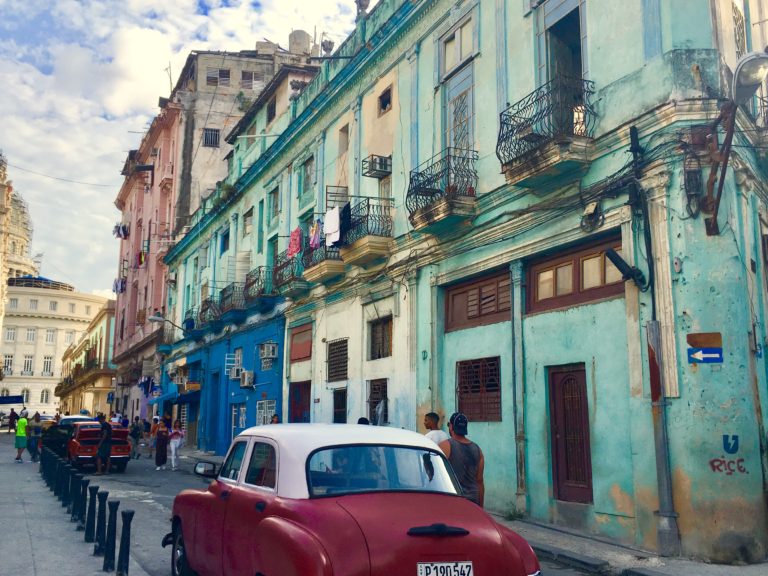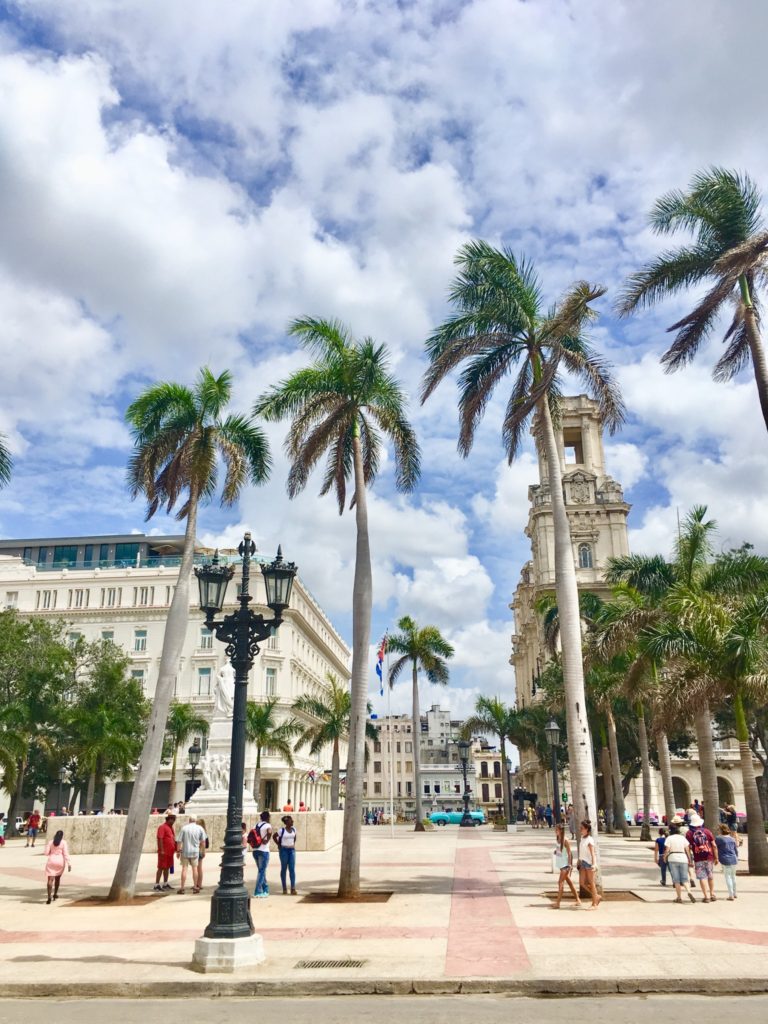As the plane descended into Jose Marti International airport I could feel the butterflies in my stomach going ballistic. It was early March and O and I had just left behind copious amounts of snow in Toronto for a seriously last minute and vital escape to a tropical paradise. We spun the proverbial globe and were left pointing to Cuba when it stopped spinning. Now it was my mind that was spinning as I watched lush green palm trees nearing on our approach. The plane touched down and the blurred oasis rushing by slowly came to a standstill. We were in Havana. After a mundane customs process which seemed to only be prolonged by our eagerness to breathe the warm Cuban air, we found ourselves outside of the terminal. Immediately we were overwhelmed by the hot, humid air, the brilliant sunshine and dozens of cab drivers shouting “taxi!” in a very thick accent. We exchanged money at a kiosk as per a security officer’s direction and followed a cab driver to one of the many classic cars filling a parking lot across the street from the terminal.
As we drove on winding highways from the airport to our budget accommodation in Havana, we slowly began to feel more at ease. The buildings on the side of the road looked run down as though no one had cared for them in decades. The windows were open in our restored bright pink taxi. We sat on a white leather upholstered bench which was the back seat. I closed my eyes and focused my attention on the salty air blowing wildly through my hair, relishing in its warmth. Before long we were in the streets of downtown Havana. The taxi driver was turning the corners almost too fast, dodging potholes with ease. We stopped in front of an open door and our driver indicated that we had arrived. O and I looked at each other and then at the building. Was this right? It did not look like a hotel, or a hostel for that matter. We cautiously got out of the cab. In the doorway stood an elderly woman, clearly warn by the toils of life but with a bright smile fixed on her face. She greeted us in Spanish and gestured us into the house. Immediately I was grateful for the limited Spanish I learned in elementary school and realized how much it would come in handy this weekend. So far, not a word had been spoken to us in English. I took one last look down both sides of the street before entering the house with my duffle bag slung across my shoulder. The street was dusty and the paint was chipped and fading on the rows of connected buildings lining both sides of the street. But at the same time, each individual structure, though all connected, radiated its own personality. Each was a different height and wore a different color. It was clear where one household ended and the next one began. Despite the worn appearance, it was very easy to picture these buildings new, many decades ago.
We settled in, exhausted from the travel so far. O declared his need for a nap and I reluctantly accepted, slightly disappointed that he wasn’t interested in hitting the streets immediately as I was. Nonetheless, I left him in the room to sleep and ventured to the kitchen of this “casa particular,” as these types of accommodations are called. I walked in to find the same elderly woman in the kitchen, stirring a pot of something on the stove and another woman about half her age sitting at the kitchen table going through paperwork. They immediately stopped what they were doing when they saw me and gestured to the empty chair. I sat down and the elderly woman put a glass in front of me, filling it with a thick pink liquid. “Jugo de guayaba” she said, clearly responding to the confusion in my expression. I had never had guava juice before but as soon as I tasted it I was hooked! I emptied my glass and she eagerly poured me another. We then proceeded to make small talk. I learned about their family and their way of life here on this incredible island and I offered what limited information I could formulate in Spanish for them about my life in Canada and my upbringing in Florida. I was both intrigued and grateful for their patience with my struggle for words.
That evening O and I decided to venture to the waterfront. As soon as we walked out into the street we were once again in shock and felt immensely out of place. The street was filled with locals playing music, dancing in the streets and calling out to us in Spanish what we thought could only be derogatory remarks. I had never felt this uncomfortable! We went back inside immediately. What just happened?! We exchanged comments of disbelief and disgust. It was then that we saw our hosts watching from the kitchen doorway trying to disguise their amusement. The younger lady explained that this is part of the culture. The people just wanted to be friendly. Their remarks were harmless, complementary in fact! Slightly comforted we gave this excursion another try. With this brand new perspective we were no longer anxious. We felt the welcoming energy of the locals as we made our way about three blocks to the oceanfront road called the Malecón. It was the famed gathering place of locals every night for decades. Lovers would walk hand in hand. Kids would play and stand on the seawall catching fish. Tourists would admire the culture and architecture. Music was playing everywhere and there we were, invited to take part in this adventure. The sun was setting and we were walking along the Malecón, drinking the wild air and taking in the real and unexpected magic of Cuba.













